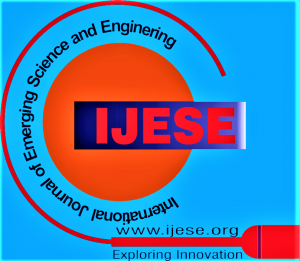![]()
A Classification Pipeline Methodology for Predicting Personality Traits
Suhana Thakur1, Riya Kanwar2, T Manoranjitham3
1Suhana Thakur, Department of Computing Technologies, SRM Institute of Science and Technology Kattankulathur, Chennai (Tamil Nadu), India.
2Riya Kanwar, Department of Computing Technologies, SRM Institute of Science and Technology Kattankulathur, Chennai (Tamil Nadu), India.
3Dr. T Manoranjitham, Department of Computing, Technologies SRM Institute of Science and Technology Kattankulathur, Chennai (Tamil Nadu), India.
Manuscript received on 25 March 2024 | Revised Manuscript received on 26 October 2024 | Manuscript Accepted on 15 December 2024 | Manuscript published on 30 December 2024 | PP: 6-11 | Volume-13 Issue-1, December 2024 | Retrieval Number: 100.1/ijese.E95100412523 | DOI: 10.35940/ijese.E9510.13011224
Open Access | Editorial and Publishing Policies | Cite | Zenodo | OJS | Indexing and Abstracting
© The Authors. Blue Eyes Intelligence Engineering and Sciences Publication (BEIESP). This is an open access article under the CC-BY-NC-ND license (http://creativecommons.org/licenses/by-nc-nd/4.0/)
Abstract: With multiple advancements in machine learning and deep learning a multitude of tasks that were either too complex to hardcode or even regarded as impossible can now be performed. This technology can be used to our advantage to determine someone’s personality based solely on their perception and opinions. Nowadays, a lot of tasks involving the victim’s personality are necessary for criminal activity surveillance, personality has started to play a significant role in mental health therapy as well as hospitality businesses are trying to monitor the personality of customers to provide better services. We can assist in the completion of such a work by combining deep learning with a classification-based machine learning model connected by a data pipeline. The use case can also be extended to hospitality businesses to understand the mindset of the patient and is also useful during selection of candidates for a particular job profile based on their personality traits. It is also used in many successful marketing campaigns to target specific audiences. We propose a combined classification pipeline that employs both unsupervised and supervised deep learning approaches such as K-Means along with LSTM, GRU, RNN and Autoencoders (Deep Embedded Clustering) to draw a comparative analysis between these approaches to analyze personalities successfully.
Keywords: Deep learning, RNN- Recurrent Neural Network, LSTM – Long Short-Term Memory, GRU – Gated Recurrent Unit, DEC – Deep Embedded Clustering, Autoencoder, Personality Prediction, OCEAN- Openness, Conscientiousness, Extraversion, Agreeableness, Neuroticism.
Scope of the Article: Computer Science and Applications
